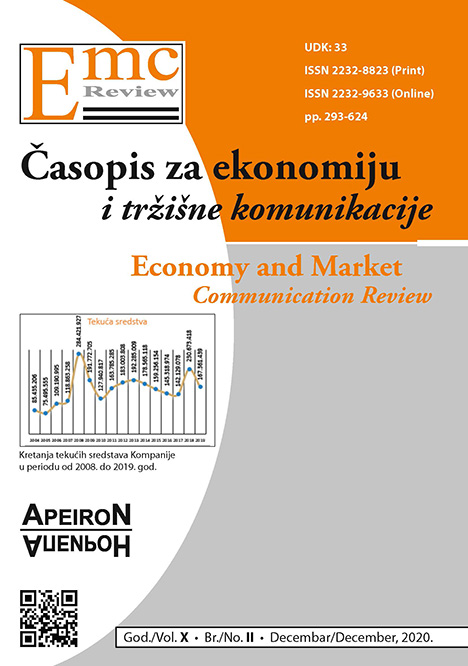QUANTITATIVE ANALYSIS OF OPERATIONALIZATION OF ATTITUDES AND MOTIVATION OF MANAGERS IN RAISING THE PERFORMANCE OF THE TV SERVICE
DOI:
https://doi.org/10.7251/EMC2002357RAbstract
The activities of media management have the task of overcoming all the surprises in the turbulent financial and media market, using permanent education. Management must be modernized in organizational terms, with the need to monitor and introduce technological innovations, such as networking and virtualization.When we come across organizational performance problems, and if one thinks it is a motivation problem one should ask: Are motivational problems different from performance problems? Should the concept of motivation be added to our understanding of this problem or is it possible to discover and solve it with an existing HPT tool Human Performance Technology? If performance variables such as goals, equipment, feedback, and incentives have worked effectively, is it possible that motivational problems still remain?In this paper, by quantitative analysis based on the total variables of two focus groups and three groups of stakeholders, we were able to clearly define the statistical differences between public and commercial TV service, as well as to determine their characteristics. What consequences can these changes cause in the long run? Will they be repeated and in which direction will managerial functions develop further? Quantitative data and indicators obtained by empirical research will be processed by the statistical method. Statistical methods for comparing groups with several techniques and tests (one-factor analysis of ANOVA variance, non-parametric technique and tests) will be used to prove the hypotheses.Starting from the above theoretical and empirical findings, we set four basic and four auxiliary hypotheses. By applying different methods of determining the existence of attitudes and motivation of TV service management that exist in the real economic world, the collected quantitative data obtained through the instrument / questionnaire will be statistical analysis, calculate the proportions of their interdependence during economic processes. They will show that different factors from the macro and micro environment, influence the attitudes and functioning of management. Communication with target groups, ie the audience with a specific approach depends on the motivation and attitudes of the management, which depends on the innovation and creativity of the management. Communication, the environment in the organization, business culture, social responsibility, depend on the attitudes of management that shape the image of TV services and their development. Attitude and motivation ensure competitiveness in the long run, as well as retaining the audience and advertisers. Based on the stereotypical public opinion, it was expected that the public service would have a more motivated management, that it would invest more in the quality of information and programs, in order to diversify media, cultural and educational content. A statistically significant difference in the motivation of managers in favor of commercial TV service was found. Motivated management can achieve a cohesive business intelligent TV service and thus the quality of service delivery and quality program to the target market while respecting the political, economic, technological, environmental and social factors that operate in an environment covered by the TV signal.
